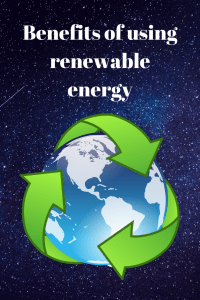
There are a lot of benefits of using renewable energy, in this article you will learn about them.
Renewable energy is simply energy generated from complementary sources such as sun, wind, water, biological processes, and geothermal energy.
Compared to fossil fuels and coal, these natural resources are usually referred to as clean forms of energy because they do not produce harmful emissions and pollutants in the atmosphere, and therefore have a little environmental impact during the production process, which contributes well to the conservation of our environment.
There is no better way to reduce electricity bill charges than using renewable energy.
However, some people may need more persuasion to switch to alternative sources of renewable energy. Some benefits of using renewable energy.
Moreover, renewable energy is one that comes from natural resources that are consistently replenished. Examples include:
• Geothermal Heat, from Earth’s interior heat
• Solar Energy, from sunlight
• Hydraulic Energy, from water
Not every energy source is renewable, however. Non-renewable resources like coal and petroleum are limited and will go extinct one day.
During this era of much-heated debate about environmental issues, renewable energy is quickly gaining strength and adherence.
However, these alternative and clean means of moving the world are not always welcomed as old prejudice and ignorance remain.
Nonetheless, the benefits that renewable energy can bring are many and unquestionable.
Renewable energy helps protect the environment.
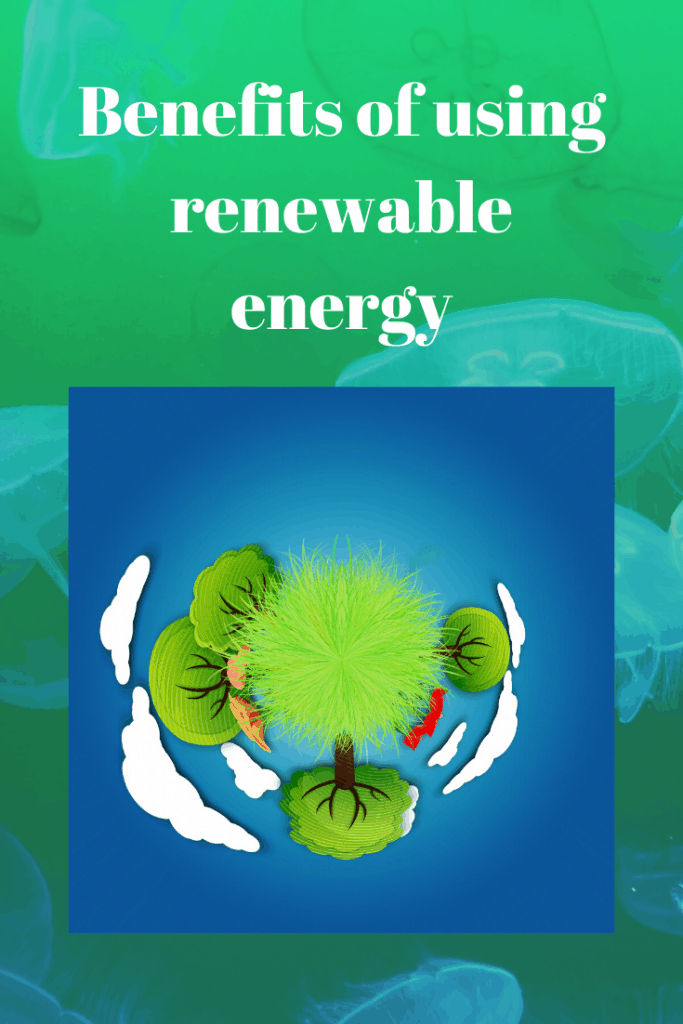
If you are an ecologist, you should immediately switch to renewal. In a way, this is not about reducing energy bill fees.
The environmental part of your care helps protect the world from pollution and global warming.
The use of renewable energy can be very beneficial for the environment when it comes to reducing pollution, which is already a major threat to the entire population of the planet.
Environmental impacts from the use of green energy are relatively small and more local than the widespread and widespread impacts of fossil fuels such as natural gas, coal, and oil.
The use of many modern energy sources, such as coal, encourages the release of more greenhouse gases that contribute to global warming.
If you use renewable energy sources, you will not pollute or heat the world.
You can reduce your energy bill by 80%.
Solar and wind energy can help reduce your electricity bill by up to 80%.
This is a lot of savings for you. Also, some households that consume less energy may use lagging meters.
This means that the power company may eventually have to pay for extra energy rather than what you do not use.
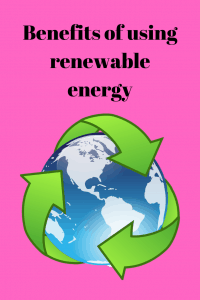
reduces life cycle emissions and greenhouse gases.
The major health problems caused by air pollution from fossil fuel production are of great concern.
Air pollution, which worsens the respiratory function of children, has become the biggest factor in the death of many young children.
Small particles caused air pollution in many deaths because the risk causes heart and lung disease.
Green energy sources have very few products or are not released into the air, and are therefore the safest energy source.
Economically, green energy has proven to be inexpensive in the energy-generating industry saving billions of dollars, resulting in large energy sources that will sustain many people for longer and longer.
The policies needed in many countries to create renewable energy will be restructured by many who want the next generation to be healthier and less concerned about pollution and other costly waste management issues.
This should be more than sufficient to explain the benefits of renewable energy.
Why Renewable Energy?
There are several reasons why renewable energy is a superior choice for humanity to use in the future, for both the environment and the people living in it.
Here are some reasons to consider when comparing it to the use of fossil fuels.
Renewable Energy Helps the Fight Against Climate Change
Over recent years, the conversation about climate change has come into the public consciousness.
Many individuals are now concerned about their carbon footprint. Scientists warn that we will reach a ‘point of no return if we don’t act soon.. A big contributor to helping combat this is renewable energy.
A renewable resource such as wind or solar power is cleaner for the planet because it does not rely on emitting harmful greenhouse gases such as carbon dioxide or methane into the atmosphere.
This, in turn, helps prevent damage to the ozone layer, which is the layer of molecules that protects the earth from the sun’s ultraviolet radiation.
Renewable Energy Doesn’t Run Out
Fossil fuels such as oil and natural gas are finite resources. Even if they were not harmful to the Earth, humanity will still eventually run out of these fuels. Renewable energy is an indispensable part of developing a self-sustaining energy system for the entire planet.
As the name implies, renewable energy sources will naturally replenish themselves, or there is so much of it (i.e. water, solar power) that we can never possibly use it up. Switching to using renewable energy is an essential part of securing the future of this world.
They never run out of supply
The word renewable says it all. As long as the sun shines or the wind blows, you will have a reliable energy source that you can rely on. Of course, common sense will tell you that the sun and wind will never disappear until the end of the world.
On the other hand, current energy sources such as coal and natural gas have limited resources that will eventually run out in the future.
Renewable Energy Improves Public Health
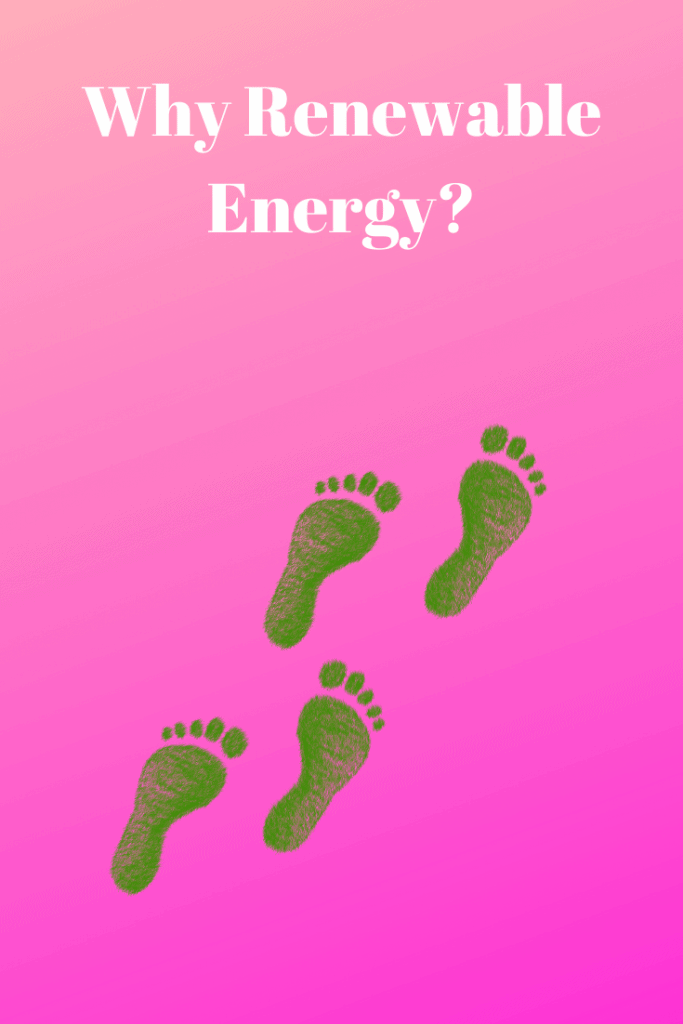
Air pollution can have a major effect on public health, especially in developing nations such as China and India.
The microscopic airborne pollutants caused by fossil fuels when inhaled over the long term can lead to many negative effects on the body.
When they enter the circulatory or respiratory system, they can result in a person’s lungs aging prematurely, as well as other impacts on the heart and brain, The UN considers air pollution to be a human rights violation.
As a clean source of power, this is another reason why renewable energy can help contribute to a better quality of life for people across the globe and also lift the burden on national healthcare systems.
Improved Health
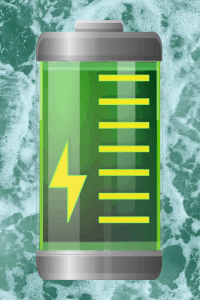
One of the lesser-known advantages of using renewable energy is that it improves people’s health.
While power plants like the ones based on coal, release toxic compounds in great quantities into the air, eventually finding its way into the bodies and lungs of people.
But renewable power plants based on renewable energy don’t contain said compounds in high concentrations, significantly reducing cancer, breathing-related problems, heart attacks, and a myriad of other issues.
Public health improvements
Emission of carbon IV oxide harms our environment.
They can also result in significant health problems.
Switching to renewable energy sources improves our health; Solar, wind and hydro energy all produce fewer emissions.
Also, geothermal and biomass are cleaner alternatives compared to fossil fuels.
How Animals Benefit From Renewable Energy
Renewable energy can help combat the effects on the lives of both wild and domesticated animals.
With non-renewable sources having such a negative effect on the climate, extremely hot and cold conditions can cause heat stress for both pets and livestock.
For wild animals, the pollutants from non-renewable sources can destroy their natural habitats and make it hard to access clean food and water.
Oil spills can also have a disastrous effect on sea creatures. Renewable energy helps reduce the suffering of all sentient beings on the planet, not just humans.
Renewable Energy is Becoming The Cheaper Option
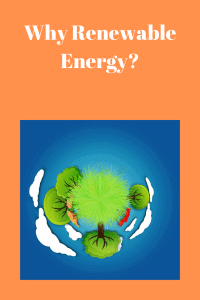
As well as being environmentally friendly, economic benefits are increasingly becoming one of the reasons why renewable energy is the best option to use.
Because of the increasing environmental concern, investments are steadily increasing in renewable energy resources.
Solar, wind, and hydropower are rapidly becoming competitively priced compared to their fossil fuel alternatives, while hydroelectricity leading to the cheapest energy source for electricity in the world today.
In conclusion, there are many different reasons why renewable energy is the best choice for everyone.
Whether the concern is being healthy, animal welfare, or the future of the planet.
Lower Prices for Electricity
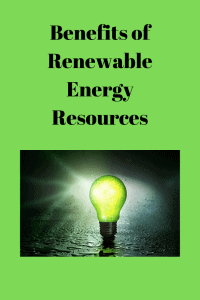
Utilizing natural renewable resources is, by far, the smartest choice to make in the future as our electricity providers.
In the first place, sources like sunlight or wind are abundant.
On average, a house could get 5 hours of sunlight a day, enough for reducing the regular electricity supply and its bill in a large way.
In addition, renewable resources cannot be commercialized by specific companies, therefore, they cannot be sold on fluctuating prices.
And something even better is that if we generate any kind of renewable energy and don’t use it, that energy is sent back to the electricity grid and we get rewarded.
Long-Term Profits and Economic Development
Since you don’t have to pay for refuel, costs of maintenance and operation are significantly reduced for renewable energy, allowing countries to save millions of dollars every year.
Not only that, but it also generates new jobs related to manufacturing, management, engineering, advertisement, and other fields.
Another point is that regions that contain non-renewable resources, including raw materials for nuclear power production, are often places of constant armed conflict that end up interfering with its costs to governments, businesses, and consumers.
This leads to another advantage of using renewable resources: self-sufficiency.
Countries that can domestically provide all of its necessary energy won’t have to worry about the fluctuating prices of non-renewable resources like oil, and will be secure against both global crisis and resource conflicts.
It can boost the economy
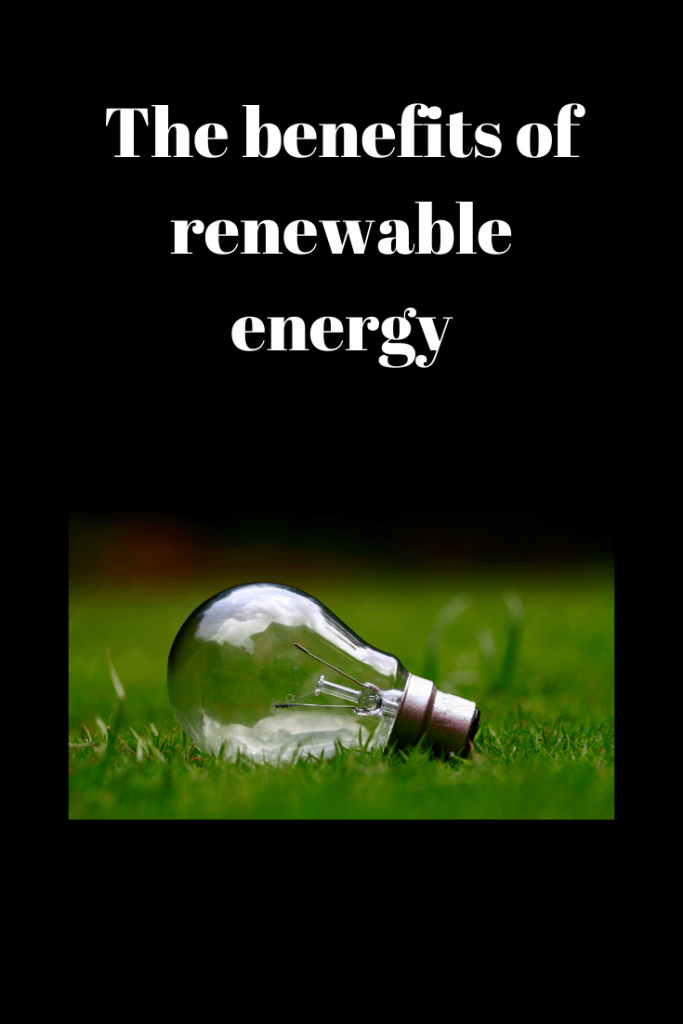
The economy can benefit from renewable sources of energy in several ways.
Solar power will need research and development. Manufacturing and construction will follow.
Renewable energy also requires transportation and installation.
There are more jobs created in line with the adoption of renewable energy.
If 25 percent of our energy is from renewable energy, jobs will increase threefold, unlike when non-renewable energy sources are used.
Consistent energy prices
In almost all the countries that have adopted renewable sources, electricity is the most affordable and this helps in stabilizing energy prices.
The materials that provide this energy need investment.
Their operating costs are lower as the fuel in most cases is free and over time, the energy prices will become stable.
Another benefit of renewable energy technology is that it is less costly.
Projection forecast reduces cost as it becomes more mainstream.
On the other hand, the prices of fossil fuel are volatile and can fluctuate. Prices can fall rapidly or rise rapidly as the market shifts.
Benefits of Renewable Energy Resources
Benefits of Renewable Energy Resources are huge, you will learn some of them here.
Time To Take A Step
The use of fossil fuels like oil, gas or coal as energy sources has left a mark on our planet.
The global warming rises constantly and it’s about time to start taking measures to fight against this and keeping the Earth alive.
A renewable energy source is the one that is almost impossible to ever run out.
These sources naturally renew with time. In recent years several ways to generate electricity from renewable energy sources have been developed. The most popular ones are:
- Solar: Storing the sunlight’s heat through solar panels to generate electricity.
- Wind: Electricity is generated from wind motion.
- Hydropower: The energy from water motion produces hydroelectricity. Many countries have hydropower plants, which provide an important share of the energy used.
- Ocean: The electricity is generated from the rise and fall of the ocean tides.
- Geothermal: This one is referred to the deep underground’s natural heat. The heat is stored and used to generate electricity.
- Biomass: Consists of storing organic materials coming from plants and animals. The biomass is burned and the chemical energy in it is released as heat.
Taking Advantage From Renewable Energy
Several benefits come with switching to renewable energy, both for the planet, ¡and for us! Here are some of the most popular benefits:
Slows Down Global Warming
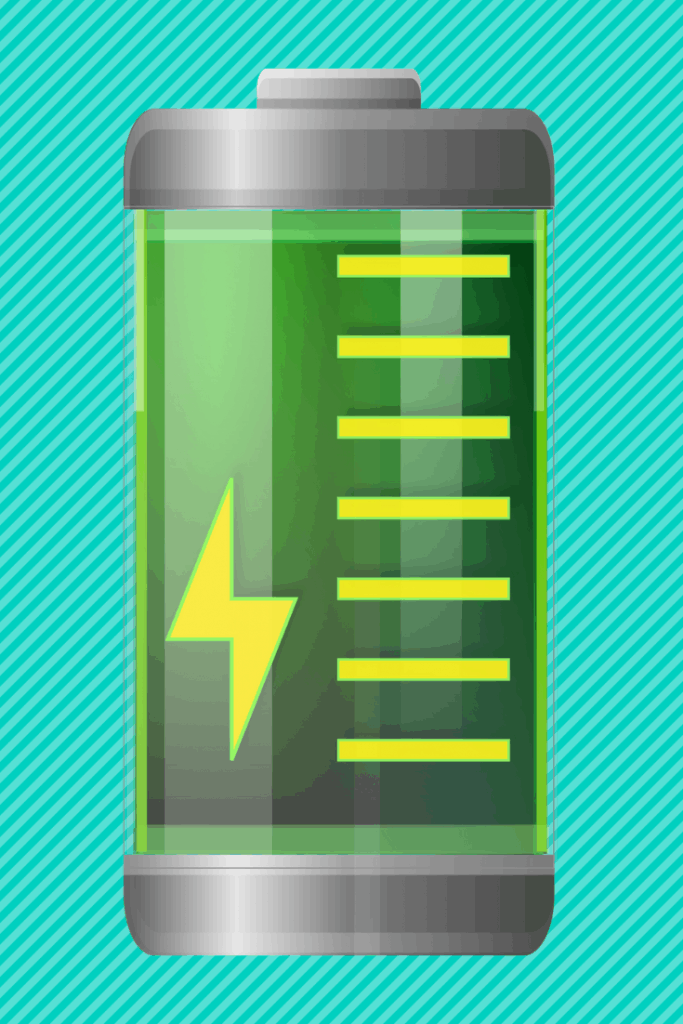
One of the biggest promoters of global warming is the use of fossil fuels.
And renewable energy sources contribute to reducing dependence on fossil fuels, preventing global warming, a climate phenomenon caused by above-normal heat retention on the earth’s surface and in the oceans.
The consequences of global warming can be catastrophic for the ecosystem: extinction of flora and fauna, droughts, floods and interference with agriculture.
Renewable energy helps to reduce the impacts of production on the environment, reducing pollution and the emission of toxic chemicals.
Reduces Impact on Global Warming
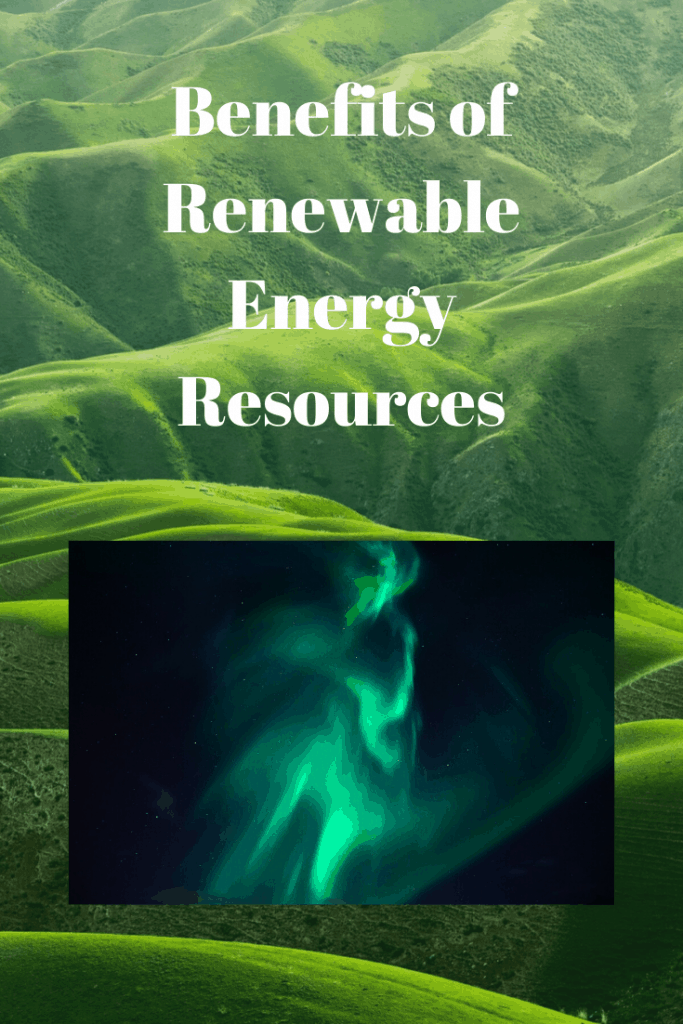
The electricity sector represents one of the largest problems in terms of climate change.
There’s an urgent need to decrease the electricity consumption coming from common fossil fuels and replace it with renewable and more “green” sources.
Renewable energy sources help to keep our environment cleaner for a long time, producing almost none harmful gasses to the atmosphere.
Moreover, we must do our best to control the effects of climate change.
We can witness the increased temperatures across the globe, storms, and rising sea levels.
Changes to food sources and habitats have a negative impact on wildlife as most species can’t adapt enough and the threat of extinction increases.
Renewable Energy and Cleaner Air
Renewable energy represents an improvement in public health.
With lesser emission of gasses, the air we breathe becomes cleaner, preventing entire cities and countries people to acquire lung or heart diseases often related to pollution.
Renewable Energy is the Present and the Future
Given all the benefits that working with renewable energy brings, several companies have invested in it since now.
It is presumed that for the year 2030, there will be over 24 million people working in this industry worldwide.
It’s almost impossible thinking to replace electricity coming from fossil fuels, as every renewable source has a deficiency, like nights for solar energy, but what it is possible is to start reducing the negative impact that is causing to our planet the excessive consumption of electricity from non-renewable resources.
Preservation of Natural Resources
When it comes to renewable energy, preserving natural resources is the first benefit that comes to people’s minds, as most polluting energy sources are exhaustible.
Oil is the classic example: Day after day, experts say that reserves will eventually run out, which would cause a global collapse. The same applies to gas and coal.
Renewable energy, by contrast, does not abuse of natural resources in this way.
It takes advantage of inexhaustible sources that can be tapped without impact.
Currently, the main ones are solar energy and wind energy.
You may wonder what are the types of Renewable Energy? There you will know some of them in this article.
Renewable energy has been highly considered and in demand in many countries around the world.
They are produced and restored naturally, such as the wind and sunlight.
Unlike other sources of energy, renewable energies are inexhaustible. They are readily available and accessible to anybody.
Limitless energy
Renewable energy provides near limitless energy, unlike fossil fuels.
They rely abundantly on sun, wind and plant matters.
Furthermore, renewables include fast-flowing water and heat of the earth. Many countries are adopting renewable energy.
Renewable energy is reliable

We can occasionally lose electricity in our homes due to power outage.
This affects many houses in one hit. However, renewable sources of energy, such as solar and wind, fail less on a large scale.
Systems are spread over a large area. Therefore, if one area suffers from extreme weather, another area will generate energy.
The modular aspects also assist with resilience and reliability.
Many nonrenewable power stations rely on water for cooling.
However, severe droughts or scarcity of water can affect energy generation.
In contrast, wind and solar need no water to generate electricity. This makes them less susceptible to changes in water availability.
In conclusion, the benefits of renewable energy are clear to see.
It is time to make a change now. With technology continually evolving, it has never been a good time to turn to renewable energy.
The benefits associated with our health, the health of our planet and the economy are evident.
Renewable energy is readily available and we need to reduce our resilience on fossil fuels.
The faster we adapt, the more we reduce pollution from fossil fuels.
Types of Renewable Energy
1. Solar
The head of all renewable energies. It is generated by converting the direct heat of the sunlight into electricity or power.
It has a lot of potential, much more than other resources. Studies have proven that it can last for the next 5 billion years.
To contain the solar energy produced by the sun, using a solar panel is the most common and most convenient way.
In larger areas, concentrated solar power is more applicable.
Thousands of glasses reflect heat onto a tower that later change into steam then electricity using turbines.
It has special materials like silicon that transforms heat into usable electricity.
2. Wind
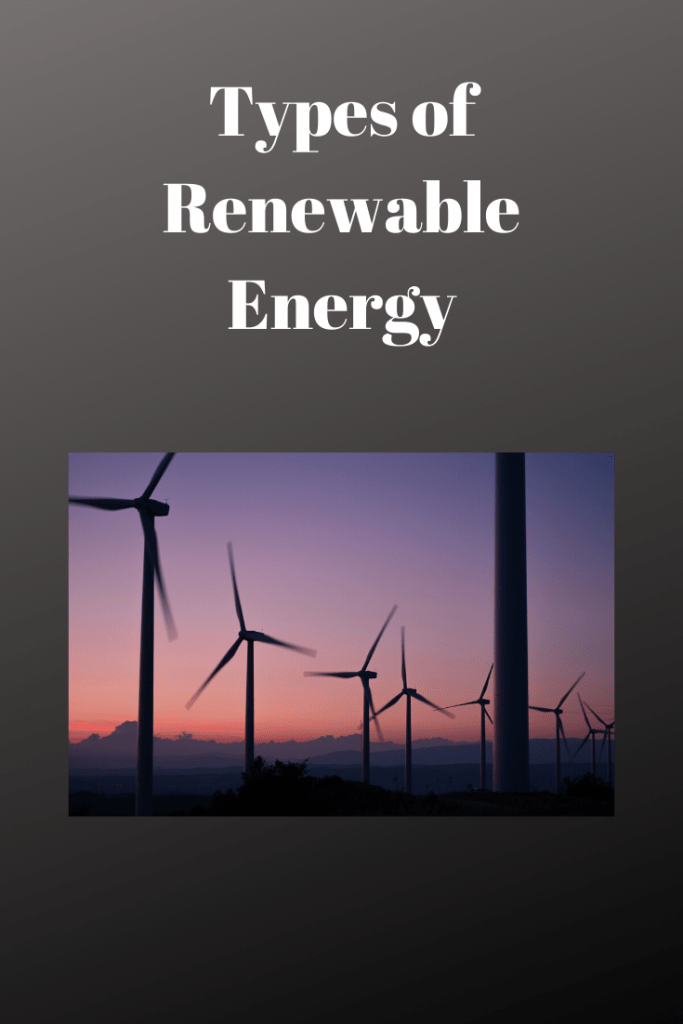
It is an air in motion. It possesses kinetic energy that allows it to move something.
Wind energy has been used right before the discovery of modern technologies.
It was used to power sailboats and windmills by our ancestors.
To this day, several countries in the world mounted windmills around rural areas to sustain their electricity needs.
Aside from this, it is known to be clean and carbon dioxide-free which helps to protect the environment from air pollution.
Although it is limited to some areas, wind energy is highly beneficial to a lot of people as it is cheaper and useful.
3. Hydroelectric
It is the conversion of flowing water into electricity.
It is continuously renewed by the sun, which is commonly known as the water cycle.
There are two types of hydroelectricity. The most common one is the Dam.
It works as the water flows down the turbines which produce electricity. Another type is the run of the river.
Same as the Dam, it uses turbines and generators. Their only difference is that the Dam can store a large amount of water whereas the run of the river doesn’t.
Both are environmentally friendly and reliable as to the amount of electricity being produced.
4. Geothermal
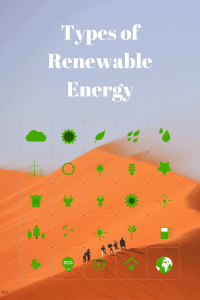
Geothermal is acquired by utilizing the internal heat of the earth using geothermal wells dug approximately 3-10 km underground.
The heat extracted below has 50,000 times energy than oils or any natural gas resources.
These wells steam the water then pumped up by the turbines through the generators to produce electricity.
It is efficiently effective, although it is less common than other renewable energy.
Geothermal is pollution-free, but it is highly expensive to produce.
5. Biomass
Biomass is the energy produced from organic matters. It is found by recently living plants and animals.
Biomass can be transformed into several energy. Examples are burned woods and garbage into heat energy.
Decomposed food crops, paper, animal manure, and yard waste into biogas. Biogas is a good alternative for fossil fuels such as coal and oil.
It is one of the most sustainable sources of energy. With the use of technology, burning biomass emits less air pollution than non-renewable energies.
Imagine the world if people will maximize using all the listed types of renewable energies. It will be a better place for us to live in as it promotes clean and safe energy.
Moreover, it can create a great impact on combating climate change and decreasing pollution that threatens the present and future generations.
What Are The Economic Benefits Of A Renewable Energy Source
You will find The Economic Benefits Of A Renewable Energy Source in this post.
The environment is going through considerable changes that are impacting life as we know it.
Humans, animals, and plants are finding it harder to breath, dealing with extreme temperatures, and depleted resources.
Sustainable or green energy can protect the environment if the right initiatives are put in place. For example, renewable energy sources are a great way to utilize the natural resources on the Earth while protecting its inhabitants.
What are renewable energy sources and what kind of economic advantages does it have for the Earth? This blog defines renewable energy sources and their benefits.
What Is A Renewable Energy Source?
Renewable energy sources are taken from natural resources to provide sustainability.
The sun, wind, rain, and even waves can be harnessed for their energy.
Providing electricity or other resources with renewable energy can reduce carbon emissions and greenhouse gases by at least 67 percent, according to the Environmental Protection Agency.
In fact, renewable energy drives down the costs and delivers clean energy which has a tremendous economic impact.
When natural processes are used to create energy, they are constantly replenishing themselves without a man-made effort.
Resources that are replenished on a human timescale have the potential to sustain life as we know it including animals and plants.
What Are The Economic Advantages Of Renewable Energy?
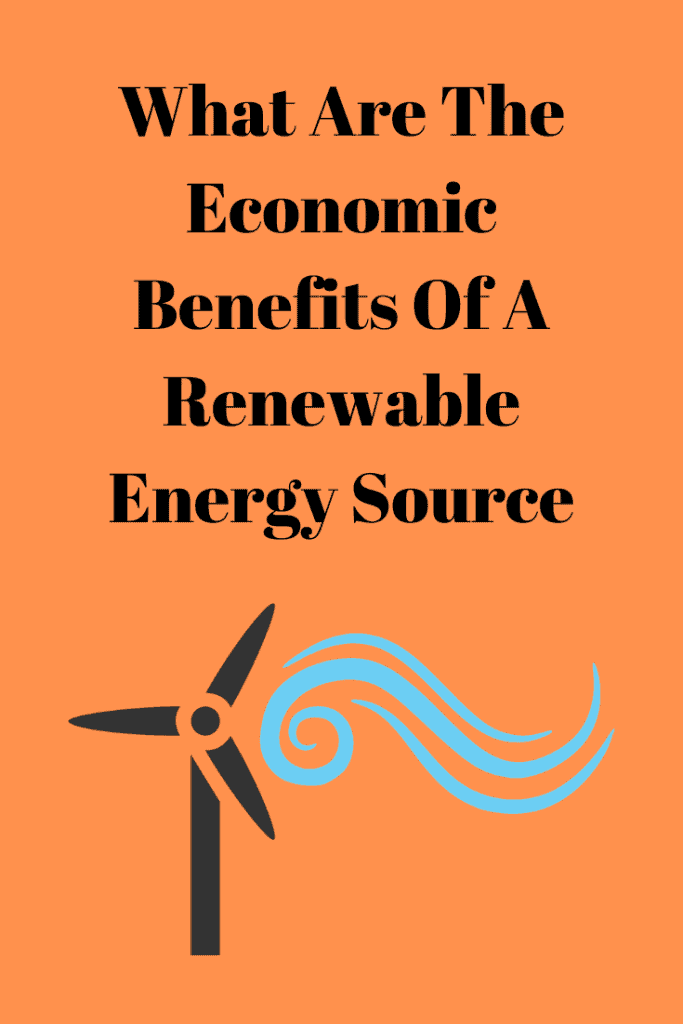
A renewable energy revolution is taking place in the U.S. renewable energy sector.
As global warming and major ice cap melting threatens the Earth, a need for renewable energy resources has increased.
Economically, using renewable energy can help Americans reduce their energy costs and encourage the deployment of the nation’s rich energy resources.
In fact, it’s a great time for investors to take advantage of renewable energy stock.
The future calls for a more sustainable energy resource.
What are the other advantages of renewable energy?
Reducing air pollution is another economical benefit of using renewable energy. Air pollution occurs when gases are released in the air.
These gases can come from cars, factories, and exhaust.
When we actively reduce the amount of man-made resources and rely on renewable energy resources, we’re creating these types of economical advantages.
Plus, using renewable energy sources reduces the carbon monoxide being released by every home by 26 to 32 percent, according to the cleanerandgreener.org online.
Carbon monoxide reduces the ability of the blood to bring oxygen to body cells and tissue.
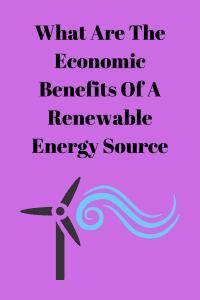
Humans must incorporate renewable energy into electricity and fueling their cars. We must stop burning fossil fuels, use alternative transportation, and take advantage of renewable energy.
If we want to reduce the toxic compounds of air pollution and waste, it’s important to get more facts on renewable energy sources and it’s economic advantages.
Every day millions of harmful pollutants are being released in the environment.
These pollutants can also impact our water and soil and calls for a greater need for renewable energy. Remember, the long-term impact of not using renewable energy can impact human health, the economy, and the environment.
Learn more about the advantages of renewable energy sources by becoming a part of the clean air movement today!
Conclusion
Climate Change.
Global Warming.
Renewable Energy.
These are just some of the hot keywords in today’s society related to the environment.
And as we can see in this article, there’s a good reason for that, as the advantages of using renewable are many.
Hopefully, this article has helped you better understand some of the reasons for using renewable energy and moving away from non-renewable resources.
